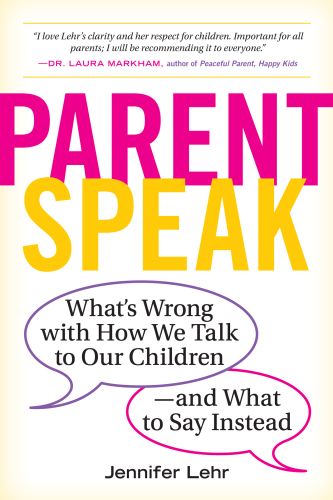
ParentSpeak
What's Wrong with How We Talk to Our Children—and What to Say Instead
کتاب های مرتبط
- اطلاعات
- نقد و بررسی
- دیدگاه کاربران
نقد و بررسی

March 15, 2017
Parenting writer Lehr (Ill-Equipped for a Life of Sex; GoodJobandOtherThings.com) offers some very sound, thoughtful guidance in examining parental praise, and how this well-intentioned habit can backfire, turning kids into junkies seeking their next compliment. Investigating how the way we talk to our kids "becomes their inner voice--the soundtrack they will involuntarily play back to themselves throughout their lives," Lehr considers 14 phrases that demonstrate how our "best intentions get bungled." Beginning with the nearly automatic "Good Job!" (setting children on a path to try not what gives the child joy but what pleases adults) to "Be Careful!" (nurtures risk aversion), she breaks down language that manipulates, objectifies, micromanages, distresses, invalidates, and threatens. Not all parents will agree with the author's findings, but she provides plenty of research to support her arguments, and her approach to alternative methods is worthy of attention. Verdict Based on the goal to respect children as individuals, Lehr's work gives much food for thought. Recommended.
Copyright 2017 Library Journal, LLC Used with permission.

October 3, 2016
Though Lehr’s (The Magic Cake) parenting guide is uneven, it contains at least one invaluable insight. She writes: “If a child isn’t responding to a reasonable request, then their behavior must be meeting a more pressing need.” She asks parents to give their child’s behavior the time and respect it deserves and then ask: what is that need? It is a profound message, rather buried in a book that can have the “15 Things Not to Say to Your Kids” feel of its blogger origins. Such formulas can be useful; parents who read this may think twice before showering children with “be carefuls” and “good jobs” and limiting their child’s self-calibration for risk and reward. Lehr has synthesized massive amount of parenting information and tested it on daughter Jules and son Hudson. Her advice can have a condescending tone, but it’s still (mostly) good advice. At worst, the final chapter’s suggestion that the criminal justice system might incentivize better parenting skills—by more stringently policing parents who use corporal punishment—is downright misguided. Yet the book contains enough gems and good reminders to make it a worthwhile read for the diligent parent. Agent: Susan Golomb, Writers House.

December 1, 2016
Parentspeak is author Lehr's term for the catchphrases that many parents (and others) default to when talking to kids. She argues that phrases like Good job! and You're okay! create a disconnect between the messages parents think they're sending and the ones kids actually receive. The book is organized around 14 common examples of Parentspeak categorized by their effects ( These Manipulate, These Invalidate, etc.). For each example, Lehr deconstructs the catchphrase, explains why it's problematic, and outlines some alternate ways of responding. Though she draws on the work of psychologists and educators like Thomas Gordon, Alfie Kohn, and Magda Gerber, her writing style is earnest and conversational, and the book is filled with anecdotes about her experiences parenting her own two children. Several times throughout the book, Lehr refers to her approach as going against the grain, and her views on disciplining children, among other issues, won't be universally agreed upon. Regardless, however, the book is a thought-provoking read that will prompt parents of all stripes to consider what they're saying when they talk to their kids.(Reprinted with permission of Booklist, copyright 2016, American Library Association.)

























دیدگاه کاربران